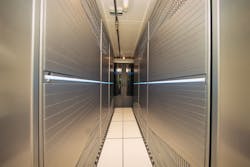Offshore staff
RIO DE JANEIRO – Petrobras will direct part of its supercomputer processing capacity to helping researchers fight the COVID-19 virus.
The company has entered a partnership with the Chemistry Department of Stanford University in California to contribute to the Folding@home Project.
The latter, launched in 2000, is a consortium that brings together academic institutions and various North American research laboratories via a computer platform to facilitate simulations for projects submitted by researchers worldwide.
It helped identify an opportunity for treatment of the Ebola virus treatment, previously considered incurable, by means of computer simulations and later experimentation.
The project now seeks to assist development of medication and vaccines for the coronavirus by studying its behavior in the human body and how the disease progresses, from the interaction of viral proteins.
It has already helped identify the protein that links COVID-19 to human cells. Petrobras will re-direct some of the processing capacity from two supercomputers for this purpose. The Santos Dumont, said to be Latin America's largest supercomputer, is in the Laboratório Nacional de Computação Científica in Petrópolis, Rio de Janeiro.
Its capacity was recently enhanced via a collaboration between another laboratory, the company, and its partners in the Libra Consortium in the presalt Santos basin. The other supercomputer is in Salvador, northeast Brazil.
Petrobras plans to allocate 60% and 50% of the two supercomputers’ capacity, totalling 3 petaflops. This will be used to accelerate the simulation time so that researchers can achieve results faster.
In addition, the company will mobilize its high performance computational resources for research projects conducted by Brazilian universities into the coronavirus. One, a partnership with PUC-Rio and Senai-Cimatec, involves the application of AI techniques (deep learning) to help differentiate between the X-ray examination of a regular influenza patient and of a coronavirus patient.
The algorithms are said to create repetition patterns and, by comparing the data, allows a diagnosis to be made. Petrobras claims the method is cheaper and faster than, for example, tomography and PCR blood examinations.
03/26/2020
